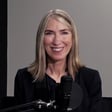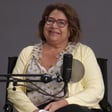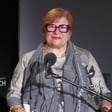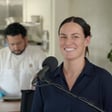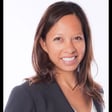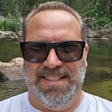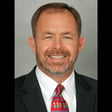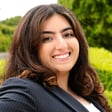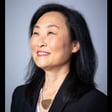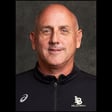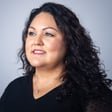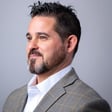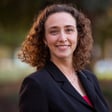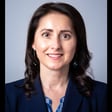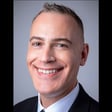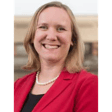Become a Creator today!Start creating today - Share your story with the world!
Start for free
00:00:00
00:00:01

Leading the Team
Transcript
Introduction to 'At the Beach' Podcast
00:00:17
Speaker
Hello, I'm Dan Montoya, Vice President for University Relations and Development. Welcome to another episode of At the Beach. This podcast shares news, personal stories, and ways listeners can be involved with Cal State Long Beach. It's produced by URD. Today we're going to switch it
Role Reversal: Jeff Interviews Dan
00:00:33
Speaker
up. I usually do the interview with a guest, but today Jeff Bliss, Executive Director of Leadership Communications,
00:00:40
Speaker
and At the Beach producer is going to interview me about URD, what it means to create a culture of philanthropy, and why CSULB is special to me and more. So, take it away, Jeff.
00:00:54
Speaker
Thank you, Dan. It's good to be here, though it's a bit strange being behind the mic on this side. and Usually it's behind that, I'm behind the glass thing. But ah for those of you who don't know, Dan, here's a bit of his resume for you. In addition to serving as CSULB's Vice President for University Relations and Development, he's CEO of the 49er Foundation, and he's also the usual host of this podcast. So that's probably where you've heard his voice before.
00:01:19
Speaker
ah Before coming to the beach, Dan served as executive director of development at Loyola MaryMatton University, and prior to that he served in successive roles at his alma mater undergrad in San
Achievements and Milestones
00:01:29
Speaker
Diego State. So he was director of development for student affairs there, senior director of development, college of engineering and regional development and assistant vice president development and alumni relations. Did I get all those? Yep, you did.
00:01:42
Speaker
All right, first so you know go Aztecs, right? You have to say that. Yeah, go Aztecs. Just trying to be fair to our sister school there. you know ah For close to 20 years, Dan has worked in higher education, particularly in development. As URD's VP, Dan led the university to the biggest fundraising success in its history. Earlier this year, he announced that CSULB had raised more than $313 million dollars through the No Barriers campaign. And that eclipsed a declared goal of $275 million. So, nice to kind of overshoot that number. Not bad.
00:02:14
Speaker
Yeah, and and you know um we just closed it out, but we could have kept going. and And we'll talk more about how we're going to continue to elevate those numbers. That's great. I mean, they're in at a time when you know we were in an economic tough time, you know sometimes we some people feel like we still are, but that's pretty remarkable that we were able to accomplish that in that period of time.
Navy Background and Campaign Impact
00:02:34
Speaker
I think it's also worth mentioning that Dan is a proud veteran of the US Navy. um And you know it's really in your podcast, Dan, but in the great tradition of your Navy, let me say welcome aboard. Oh, thank you.
00:02:46
Speaker
ah use the women when they When the ah captain of the ship comes aboard, they ring bells and they say, USS Montoya arriving. So, maybe that's me. I'll have to work that out with sound effects later. We'll have the bosun's whistle blow you have on board.
00:03:03
Speaker
ah So in addition to the spectacular finish of the No Barriers campaign, you've seen the campus celebrate some pretty big wins this year. Of course, this includes the kickoff of the 75th anniversary celebration. It seems like a very busy time in the life of Cal State Long Beach.
00:03:18
Speaker
Yeah, it is. um You know, I really want to recognize the work of my predecessors and those who were before me because I walked into the campaign already started. And so I really want to give kudos to President Conley and for her vision for for the No Barriers and then also my team and those who you know were part of the whole process to put No Barriers together.
Campaign's Influence on Student and Community
00:03:45
Speaker
and Really, um it was just an opportunity to come and and really bring it home and and and complete it. and For me, it was also an opportunity to create the systems and infrastructure that we need moving forward. so Really, in this whole process, that's really what I've been working on the last couple of years, is you know taking something that's already amazing and then developing the systems that will keep it you know amazing and keep it further developing. so ah No barriers you know was is and was ah the largest comprehensive campaign, but what it means, though, it means is that we've been able to impact the university in a greater way, right? Student success and workforce partnership and community engagement.
00:04:31
Speaker
And usually what ah comprehensive campaigns do is they help grow your endowment. And so our endowment has continued to grow and and be successful. But also there's been capital projects. There's been ah new programs and tons of scholarships have been established. So.
00:04:48
Speaker
Philanthropy is is and will continue to be an instrumental part of the beach and everything we do. So really what it is is um in with this comprehensive campaign is you know finishing a point in time in the university where you know we had a comprehensive campaign with priorities and specific priorities and initiatives that we wanted to accomplish.
00:05:12
Speaker
But it doesn't stop there. When you finish one campaign, you are ready getting ready for the next. So um you know we will continue to talk about what's next here in the next couple of years.
Importance of Community and Alumni
00:05:25
Speaker
What's going to be very interesting is you know right now we're in the 75th year celebration. And so we are in a stewardship phase. And really the importance of that is to thank our donors.
00:05:35
Speaker
says to so to do a lot of events and ah videos and mail pieces and phone calls and to say thank you for being part of our success because without this community Cal State Long Beach does not raise the money it is so in essence we want to say The Long Beach community raised this money. It wasn't just Cal State Long Beach in itself. And a lot of times we as institutions want to take the credit for it, but it's really because of the community and the donors that have been instrumental. And you know what? Our alumni base is amazing, but some of our largest gifts didn't come from alumni.
00:06:11
Speaker
So it's those community members who really felt that the work we were doing is impactful and worth investing in. So we we really have to thank all our Long Beach community and the region that we serve as well. And there are alumni that live out of California that also contributed to the success of the No Beers campaign as well.
00:06:32
Speaker
So when you're doing a campaign like this, you know, when you're involved in ah development or fundraising, you're not just looking at the here and now you're looking at the future as well in terms of not just money, but also the way that you can grow your your network of friends, your supporters, right?
00:06:48
Speaker
Yeah, that's one of the biggest things that is at
Strategic Philanthropy Elements
00:06:52
Speaker
the heart of fundraising. What I've discovered in other campaigns that I've been into is um pipeline is so critical and important. And what I mean by pipeline is it's that it starts with communication and and the interaction that our community has with us.
00:07:08
Speaker
Then it goes to that first gift, right? and And how you steward that first gift and how you engage that person and involve them into the university and it grows into a major gift. And here at at the beach, a major gift is like 25,000 to a million, you know, and then it and it matures into principal giving, which is a million plus. There's also plan giving, you know, we also, I also consider government community relations, which We have an amazing team that goes out you know um for federal and state funds, and they ah really seek out those projects that that will benefit the institution. And then our athletics program is another key part of that component. We were recently we're in search of a corporate and foundation person, which is an also a key component. but
00:07:54
Speaker
All those elements need to be firing at all times. It doesn't matter whether you're in a campaign or not. And so for me, that has been the fundamental thing that that I preach to my team at all times, because if you are successful at that pipeline,
00:08:12
Speaker
every single year, your numbers are going to grow. And it doesn't matter what campaign you're in, you're going to continue to see those numbers grow and elevate. So it's also a pipeline in the sense of building those relationships and anchoring them to the institution so that they grow with you. They're your partners, they're your investors.
00:08:33
Speaker
They're those people who come and say, hey, I want to make a difference because I know you're a winning product. right You're producing students that are amazing, that are global ready for the workplace. And I see them because I hire them. I give them internships. I've mentored them.
00:08:50
Speaker
seen them you know in action. you know I love the work that you're doing and on the faculty side. I love the work that you guys are doing creating you know strong you know men and women and in athletics. right and and the you know Athletics is probably one of our biggest champions. at you yeaho They're international. They go all over the place. So there are ambassadors and and then also the work of our board and what they're doing. So there's there's so much that happens in that whole process and that's why Our division are key facilitators in the whole process of this fundraising and philanthropic um strategy and environment.
Purpose and Focus of Campaigns
00:09:28
Speaker
I don't want to get stuck on the idea or the term of campaign too much, but maybe help listeners understand
00:09:36
Speaker
What's the difference is, because we're talking about fundraising, is it ongoing 24-7, 365 thing? what What is a campaign, why do you have a campaign? Well, campaigns are usually, they they are usually created to fundraise for specific initiatives over a period of time. So, for example, ah you know, No Barriers campaign, you know, started in 2016 and it continued to grow, it had specific themes, you know, and student success was part of it, and in a lot of elements happen within student success. It could be scholarships, it could be program support, it could be mentoring, it could be, um and and this is within each of the colleges that we have, right? And and also the Division of Student Affairs and the library and all these other things. Workforce development, you know,
00:10:21
Speaker
The Cal State system, is that's their that's their one of their primary functions is creating the workforce for California, right? It can be nursing, it can be engineers, it could be business people, you know it could be artists, whatever it is. So preparing our students and all the elements that that come into play with that are what we are ah here to do is provide those opportunities for students to go on to be successful and launch. and and contribute, right? And then, ah you know, community engagement and partnership, that's really bringing in the community to work with Cal State Long Beach to
00:11:00
Speaker
further develop the elements of student success and work for partnership and also the research aspects. I mean, we have a great relationship with the port. you know The port is a very strong logistical ah machine, right? And we have a logistics program in our College of Business. So how do we how do we build relationships with that to create partnerships, that create internships, that Create synergies where where leadership at the port can come and participate you know and talk to students here or what collaborations can we do to make Long Beach a better place right so you know the Long Beach Chamber is another one and you know we interact with with many of the businesses on
00:11:36
Speaker
And they you know they come to us for ideas or research or are our opportunities to hire students or you're also involved in industry chats where they come and tell students about their careers and how they continue to grow. So what it is is is a a time frame where you have a set goal with set priorities and and and and metrics that you want to achieve over a period of time. And it and and usually you go you hire an outside consultant that will give you an idea of what you are capable of achieving in that time frame. And then you set a goal and then you kind of move forward in that direction. and so
00:12:16
Speaker
you know that's really what how campaigns exist and and what are they designed to do. so and And usually, you know if you think about it in ah in a layman's terms, as when when i you know if I were to tell you, hey Jeff, we're we're going to do this fundraiser, we're going to raise $100,000 and we need to do it by you know, next month, right? It creates a sense of urgency. And so you are really focused and committed to the opportunities within that timeframe and everybody that you need to talk to to be ah in that but a philanthropic process to achieve that goal, right?
00:12:52
Speaker
so And it's the same thing with a campaign. right it's you're you're Again, you are running towards a specific deadline and you have these priorities that you want to hit. And so your goal is to engage as many people and partners in this so that you know you can achieve your ultimate goal and create you know endowments that will continue to grow and provide funding for all these themes that you're talking about.
00:13:18
Speaker
I know the term forcing factor is very popular, but really it seems from from your description, at least, that a campaign is a focusing factor. That's really what it does. Yeah, it is. yeah and and you know Nowadays, a lot of universities are looking at campaigns a lot different.
Future Campaigns and Leadership
00:13:34
Speaker
Some of them focus on specific themes or specific projects, capital projects, and so on and so forth.
00:13:41
Speaker
um look at opportunities to do blended campaigns where they involve research and um you know philanthropy together. And then there's the traditional one where you really focus on you know strategic initiatives and over a spirit you know specific period of time there's a quiet phase and usually you get in your quiet phase until you raise about 70% of the ah campaign dollars and then you go into the public phase to take it to completion.
00:14:08
Speaker
and um and But I think for Cal State Long Beach, the the traditional one makes sense for us because we want to continue to grow our endowment and want to continue to elevate that. So yeah, we're already talking about what's next, but you know we're you know knowing now that you know Jane is retiring and we're going to have new leadership, you know that's going to be another conversation of like what are those priorities for the new president and and where do we want to go in that direction. so um We're excited about that. We're excited what could bring in and the direction we can go. And so, you know, you know, for us, it's just going to be elevating us to the next level um in this next round. Well, you answered my upcoming question, which is going to be what's next. But so I want to touch on one more thing with the campaign, at least. And that's, you know, you talk about the different kinds of campaigns, but at ah at a university like ours where you have nine colleges, including the library, and they all have
00:15:02
Speaker
You know, their own needs, their own goals. That seems like that can be pretty tough. A lot of different, you know, I don't mean to use it derogatively, but the term hurting cats where you've got people going in all different directions to try to bring them all under one umbrella. That's really kind of where the division comes in, where you come in, right? is Bring it
Building a Philanthropic Culture
00:15:20
Speaker
all in.
00:15:20
Speaker
And that's why I say university relations development is really the facilitator of all those relationships, of all the things that is possible philanthropically at an institution. And a lot of times um you know you have to understand that faculty are focused on creating the curriculum and all the elements that teach the students you know what they need to learn, right? So they don't think in terms of philanthropy, right? You know, you have our division of Student Affairs. and i And I thank God we have an amazing vice president. And if you listen to the podcast, you know, that lesson. um A lot of those folks are are focused on the programmatic side. So 80, I would say 80% of the learning happens outside the classroom, right? So you look at academia, you look at Department of Student Affairs, and
00:16:08
Speaker
and And they think different than we do. So for us, you know, even in these campaigns is going in there. And for those of of our our deans or chairs or faculty or even program staff who don't understand philanthropy, we have to come alongside them and understand how their work enhances the work of philanthropy.
00:16:29
Speaker
And so that's that's really done in the culture of philanthropy, right? And then when we talk about a culture of philanthropy, it's like, hey, we are building something where everybody has is working from the same palette, who's moving in the same direction, who's trying to achieve the same things,
00:16:45
Speaker
And we're all you know looking for additional resources to help meet those needs and help us to achieve success. right So I think when we talk about a culture of philanthropy, it's that ongoing day-to-day conversations throughout the campus that say, you know what are you doing that's great? How can we enhance that and find other folks to come and make an impact and help you make an impact in what you're trying to do?
00:17:12
Speaker
right And so you do that over time to where eventually the campus understands how important it is, what role it plays, and then they have buy-in in being part of that process. So now we have a successful campaign, a great kickoff. How do we keep the momentum going?
00:17:32
Speaker
From my perspective, I think you know were we're it's a time for us to kind of go back to the fundamentals, right? And to look at what worked, what didn't work, to kind of assess um what areas we need to grow. So that's really what our team is looking at is all those areas that we need to grow, fill in the gaps.
00:17:52
Speaker
really think about how we become even more effective and efficient in what we're doing. And you know we're going to be facing some tough challenges with budget
URD's Collaborative Role
00:18:01
Speaker
cuts and a lot of things. So we're always asked to do more with less, right? But how do we how do we become more effective and efficient with what we have and and to take advantage of the environment in all aspects and how we can continue to develop that.
00:18:16
Speaker
My team, and in part of the whole series of the you are what is URD is bringing all my ABPs to talk about the great work that each part of the divisions do. right We've also created a PowerPoint presentation where we're going to, as a me and the ABPs, we're going to go to the leadership of campus, including academic side, ah student affairs. and You know other leadership programs ah other leadership groups across the campus and talk to them about what university relationships is University relations and development is What it does and how it can play a role in what they're doing, right? So a lot of times they don't understand that you know when when you in generally think about university relations development and from a context most people think we just create events throw parties have a good time and so on and so forth but
00:19:05
Speaker
They don't understand that it's ingrained in so many other things. So you know our division is made up of five different areas. right Development is the the fundraising actually the fundraisers that actually go out there, develop relationships throughout the colleges and the library and student affairs, and meet with individuals. right And ask them, how would you like to make an impact at Cal State Long Beach? you know What are your interests? What are your passions?
00:19:30
Speaker
And then we match them with the with the areas of focus at the at the university where they can make that impact. and those are you know those are key critical That's where the rubber meets the road, where the conversations about philanthropy happen all the time. right And then you have operations, which is the back end of the house. right and and you know well And I'll just say development is my AVP for development, Kevin Crow, who's amazing. He's been here for a long time. And he has a lot of knowledge. And he builds that team, holds them to metrics. And and they go out and fundraise for the key initiatives within the colleges.
00:20:11
Speaker
And then operations, my ABP, Nicole Forest Boggs, her job is to make sure all the data comes in and we have, ah you know, we record all the interactions with our donors so that we remember, you know, what they were interested in, what events they came to, what are their interests are and how can we further develop them, right? They they do the gift processing, she does human resource. they They look at opportunities for us to continue to identify folks who have an interest, right?
00:20:41
Speaker
So I think that is a critical component. So we have University Relations Development, which is ABP Chris Reese. And you know he is his team is amazing as well, because they they are the pipeline piece of it. right And what what it is is they work in annual fund right and and engaging those first time donors and developing them moving across the pipeline. right He also oversees government and community relations, which is also the other piece of the pipeline I was talking about in in the federal funding, state funding. And he works with our elected officials. and and
00:21:16
Speaker
And even that, there's more to it than then just going out and soliciting you know federal funds. they We have elected officials that come to the university and we host them and we show them what's going on in here at the university. We go to Hill Day in DC and advocate for the things that the the Chancellor's Office and the CSU is really looking for. right they um They handle issues around the community that that the university is involved with that we need to solve. And then we we handle ah you know the Native American program and NAGPRA and all those different things that come with that.
00:21:53
Speaker
In addition to that, the oversee alumni. Alumni operations is managing 400,000 plus relationships, right? And how do you take someone who's a recent graduate and continue to engage them throughout their whole career, right? How do you keep in touch with them? That's more like herding cats because people get married, they change their names, they move, they don't you know we don't know their information. And it's a constant dance to find out where they are, what they're doing, and how we can help them be successful.
00:22:23
Speaker
And then strategic communications, you know, ABP Jeff Cook, you know, he's he his team is out there, you know, interacting with the community solving problems, you know, um addressing issues, questions in the media and all these other things that they they are writers, they right content for us they write these great stories about the university the students they maintain websites they um they do so many different things and aspects that that is just critical to the institution and and a lot of their work is actually
00:22:55
Speaker
you know,
Transformative Impact on Students
00:22:56
Speaker
related to working with the whole campus and and not so much focused on university-related development because they have to service the entire university with the president's office, all the ABPs, all the divisions. So it's it's ah it's a critical component of everything we do. And then you have plan giving and stewardship, which is that kind of like that, um you know, Down the road, part of the pipeline where people are retired or in their there are stages of life where they say, you know, when I've done well, I want to leave a legacy, you know, when I leave a planned gift or, you know, Cal State Long Beach has been so amazing to me. I want to leave them in my estate and I will. I want to make an impact for future generations.
00:23:37
Speaker
um And the stewardship pieces is just saying thank you and and and saying we appreciate you, we value you. One of the things that I've realized in my two years here with this Long Beach community and in our surrounding region is there's so much pride here and they love this institution. They love being a part of it. Our alumni love their experience.
00:23:59
Speaker
And so when you when you interact with them, you know they just they just light up, right? And yeah, of course, they there's times where people haven't always agreed with the institution, but at the end of the day, they still love it, right? And they they love what it's trying to do. And so that's what makes what we do so amazing and powerful. like You know, we we have the opportunity to change the lives of generational generational families, right? You know, when a guardian scholar who comes out of the foster youth program and comes and gets educated here, right? it it probably I think it was, ah we I looked at some statistics, it costs close to 80, 90,000 to keep somebody incarcerated. and
00:24:45
Speaker
Usually, foster youth, they they come out of the system and a lot of them either land up homeless or incarcerated if they don't have nowhere where to go, right? Because they have no guidance. Well, we have about 147 of those foster youth that we bring here. We help them to learn to trust and heal and grow in the process. We give them an education.
00:25:04
Speaker
It costs about $40,000 for their entire degree. You tell me if that's not a great investment. And then what happens is if you give them an education, their children are more likely to go to college too. And so what happens? You change generations. You you made an impact.
00:25:21
Speaker
for years and years and years to come, which which is is the way it should be, right? We are changing the future for a lot of these people who didn't have a future. And that to me is exciting.
00:25:35
Speaker
you know I wanted to bring up two other departments within Chris Reese's area or that I think are worth mentioning because they're so stand out. One is the Anna and the Guy Center, the Alumni Center, right is ah is under their supervision. And that's such a beautiful new space. And we've had so many events there. And I think that's not only a great example of a well-run part of the institution, but also a great example of what philanthropy can do, especially alumni philanthropy.
00:26:04
Speaker
And the other one is the events team, the special events team. Because yes as you and Chris have pointed out before, they are small but mighty. You're right. i i Again, to look at Chris's team, there's so many critical components. And yes, you're right. I forgot to mention the events team. And they're so amazing. if you ever okay So there's so many events that happen on campus. right And you already is a part of it. when We just finished Winterfest. Amazing. like So beautiful.
00:26:33
Speaker
but you don't see the behind the scenes that happens with them, right? Commencement is a production of six days of graduation. Over 100,000 people come and go. It's a safe environment. Everybody has a great time, but nobody knows the behind the scenes. And so, yeah, I got a shout out Sally and her and her team for the amazing thing. And they're they're not a group of like 10 people,
00:27:00
Speaker
It's three or four people doing all these things. So you're right. and and i And I apologize for not mentioning the events team, but yes, they are amazing. And I'm so proud of the events that they put on because when they do it, it's done well. Yeah. And I wonder, the reason I wanted to call them out, especially is I've, like you have been at other universities before and they've had huge event staffs and done maybe half the jobs they do.
00:27:27
Speaker
And what is interesting is, uh, is our team here. It's not just like, Oh, you can look out and say, we're going to have an event every day. And that's not unusual, but sometimes they'll have two or three events in a day. It starts in the morning with a breakfast event and then a lunch event. And then at night there's another event, an alumni gathering or a chat or something. And it's really remarkable how such a small team, but they're so cohesive, yeah so goal focused. Yeah, and and the other thing too is I get a lot of compliments and people say man. That was great. We felt we felt Like it was it was family, you know, like it was the university family and that's what felt good
00:28:05
Speaker
Let's talk a bit about the division some more. You know you you oversee a pretty big area. how How do you do that? What's your philosophy? How do you make that happen? Well, OK, we're a group of about 70. And you know what it was is coming in and creating the culture that you want us, or that I wanted the university relations and development to um live in, be a part of, grow,
00:28:33
Speaker
And so we've we've really built a strong culture and and I'm very proud of that because you know I got to sit with my ABPs and we talked about this and we're like, hey, what what kind of culture do we want it to be, you know from where it is now to where it needs to go? What what really is is the thing that that we need to develop and
Vision and Mission of URD
00:28:54
Speaker
grow, right? and And it wasn't coming in and turning it upside down. It's like saying, what are we good at? What could we do better? What's missing? And so we came up with a vision. Our vision is to inspire and facilitate meaningful connections at Cal State Long Beach community to establish a culture of philanthropy that provides opportunities to continue building a world-class learning institution that embraces diversity, equity, inclusion, and access, right? That's our vision. That's what we aspire to do. And our mission is
00:29:22
Speaker
ah to continue to elevate Cal State Long Beach as a premier higher education institute through the development and strategies of programs and relationships that inspire advocacy, stimulate philanthropy and public funding, forge strategic partnerships, and enhance organizational and effectiveness. We aim to add value to the Beach degree, reinforce our iconic brand, and honor our university's role for the public good.
00:29:48
Speaker
so When we created this, we had buy-in from everybody. So in other words, the ADPs, we all got together. We talked about this mission vision. We have ways of working, which are our values, accountability, committedness, collegiality, collaboration, right? Those are the things that we live every day. And so we had them farm it out to the rest of the the division. They provided feedback, and then we brought it back.
00:30:16
Speaker
So we built this culture together and that is what has made this team such ah synergistic and high functioning and had an opportunity for us to continue to grow. And then we continue to add strategic pieces to this team to help it grow and elevate.
00:30:36
Speaker
So, you know, at the core is my AVP team, which is which is which is the in in the military right and in Navy terms, it's the combat information center, right? It's the heartbeat of the ship that gives the commands to the ah captain on where to go, sees dangers to helps and understand, you know, what are the potential obstacles are there? What are the potential opportunities? But it allows that this vessel to achieve its mission. And so I think for me, when I think about leadership, leadership is not saying go do this. And then I'll watch for me, it's like, let's go do it together.
00:31:18
Speaker
And that's really what we do. We do the mission of university relations and development together. And so we celebrate our wins. We we celebrate our failures. We learn quickly. We adapt. We change. We grow. um The other thing too is we focus on making sure our health is good, our family is good. And then we know that when we come to work, we're gonna we're going to be committed and we're going to be all in. So I think our team understands that. They understand that's the culture. That's the expectation.
00:31:48
Speaker
And then we just go out and perform. you know i i I want to think of our jobs as not a job, but something that is an extension of who I am. So I love my job. I love to come and to interact with my team on a regular basis and think about ways that we're going to impact the institution, the region and the world for good in a way that is going to launch students to be successful, the university to keep doing amazing things and to be a force for good and a factor within this region that does amazing work. Right. So to me, what I do is it's awesome. You know, it's it's maybe it's my ministry. That's what I call it. It's like it's what I was called to do.
00:32:34
Speaker
I think it was interesting you harken back to your days in the Navy. yeah And that probably gave you some good insight or informed you as to you know how you'd manage one day in terms of that intake and, ah the as you pointed out, the opportunities, the obstacles, and then being able to make a decision
Navy Experience Shaping Leadership
00:32:54
Speaker
from that. And you count on those people, the people who are your people in the CIC, Information Center, your AVPs, and their crew to give you the info, right? Yeah. And what I learned in the Navy, and I really accredit the Navy to helping me shape who I am, it was probably one of the most important things that I've ever done. And I remember when I went in, I was always doubting myself. I was like, man, I should have went to college, because this is not what I could be doing, right?
00:33:27
Speaker
And I took for granted the lessons that I would learn. And what I really learned in the military is how showing up every day is important. And the other thing I learned is systems. And if you create sound systems and you repeat them consistently with constant improvement, they will sustain you for years and years to come. To this day, if you go on a Navy vessel, there's a lot of systems there that have been in place for years for a reason.
00:33:59
Speaker
And they are sound systems, and they're done continuously every single day. And because of that work that's done every single day, a vessel is prepared to go to war or to achieve its mission. right you know we We talk about Kobe Bryant. We talk about Michael Jordan and their work ethic. right They showed up every day. They put in the work. So when their time was called,
00:34:27
Speaker
It was second nature. And that's the same thing with the military, the Navy. like You train so much that when you're put in that situation, it's second nature. And so I think that's what we want from the team. We want to train so much in the art of philanthropy and constant improvement and and finding ways to be better, better every day so that when it comes to creating these relationships, we just continue to do it.
00:34:55
Speaker
day after day. And we're not talking about just relationships that are transactional. We're talking about relationships that last for years and years and years. Because that's what Long Beach is. Long Beach is a place where when you come in and they establish relationships, you have relationships for a long time. And that's how our donors are. They they stick around for a long time because they love Long Beach. They love this institution. And you know what? Long Beach has a lot of remnants of the Navy and then and the naval base that was here.
00:35:25
Speaker
So I see a lot of that too. I think that was very similar when I came here from what San Diego was because there's ah there's a lot of that pride. There's a lot of those those elements here as well. But I tell you what, yeah the Navy was amazing, taught me a lot of great things. It was tough, but um I grew as a person and i am for I have been forever changed because of that experience.
00:35:50
Speaker
And I think it's interesting here at Cal State Long Beach, as well as some of the other CSU campuses, there's a ah good population of veterans. yes And people often think about diversity, about being ethnic groups or orientations. But there are also these people that come from, they already have a life work experience as a veteran, whether they're Army or Navy, whatever it is. And I'm always interested to see those people in the in not just the student space, learning, but also the workspace because they bring a whole different perspective that improves the institution, I think.
00:36:24
Speaker
Well, when you when you're in the military, what you experience is a cultural experience. And it's ah it's a breaking down of the individual to create a team player. right So that's what boot camp is all about, is about breaking down the individual and and kind of reprograming reprogramming them to think a different way in in terms of you know ah ah teamwork and a work ethic that is designed to serve the functions of the military, right? When you go into boot camp, you're put together with, you know, my company was, I don't know, maybe 100 guys from all walks of life. Like, you know, some of them came from almost every part of the country.
00:37:12
Speaker
You're put in together. youre Your heads are shaved. You're given the same clothes. You're put in the same rooms and elements and all these things. And then you're programmed the same way. And so you don't look at you don't look at you know where they're from, what their ethnicity is, you know what their socioeconomic background is. What you realize is that these are the guys that are going to go to war with me.
00:37:40
Speaker
And I have to learn to depend on them, regardless of the situation or what our upbringing is. We have to depend on each other to survive and to go out there and achieve the mission. And so when you when you go to boot camp and then you get to your ship, and my ship was,
00:37:59
Speaker
was about over 200 sailors, and then we carried Marines, which is another 300. So you know was ah it was an amphibious salt be aphibious assault ship. right And so when you're out there,
00:38:14
Speaker
the only thing you care about is is making sure that the mission is accomplished and whatever it takes you know what I mean and every day they create a plan of the day and you know exactly what's gonna happen and and they you see that every single day it's posted the night before and you know what's gonna happen so you know where to be and what to do and all that other stuff so it's that continual cadence of of consistent training and learning and and adapting and learning how to depend on each other and learning how to trust each other and learning how to develop each other and and celebrate each other. And then when you're down, you pick each other up. So it's ah it's ah it's a very unique thing you know that that unless you go there, you want to understand. So when you when they come out of the military and you put them in a classroom,
00:39:05
Speaker
They're mission-driven. They have a target, which is the degree. And you know it's it's here's what I need to do to get there. When I went and I started off at a community college down in San Diego, Southwestern College, and I went there. And first thing I did, I came in to say, look, no BS. Here's what I want to do. Create a plan for me. And they did, right? And then I transferred on and went to San Diego State. And when I got to San Diego State, I said, hey,
00:39:33
Speaker
at the time there was only a window that gave your DD 214 your benefits and all that and it's like hey here's what I want to do create a plan for me because I need to go and it was so amazing because when I'd go to class you hear all these you know students who came out of high school and the way they talked the way they thought was so different because they didn't have a, I call it a a bachelor's degree in life.
Military Experience and Education Value
00:39:58
Speaker
They didn't have a real world experience of going to Mombasa, Kenya and seeing what poverty is really like. They didn't have an experience of going to the United Aramids and seeing another country in the and the culture that they live in, right? They didn't have the opportunity to see what you know a combat environment is like, right? Where life and death really happens.
00:40:20
Speaker
They didn't have the opportunity to explore different cultures in a way that would just kind of, you know, blow your mind and they would help you to understand that other countries do things better than the United States. Obviously, I love the United States and we we are an amazing country, but there are things that other countries just do a little better than us. And that's just the reality of it. But again, that experience,
00:40:45
Speaker
prepared me to just excel even more in the class. And all along, I always thought I was behind. right But at the same time, I was i was actually you know way ahead of most people in life. And all I needed was the book knowledge to go on and do the thing that I needed to do. I think it's fair to say that for some people, the military is a great place to start their higher education.
00:41:12
Speaker
Other people right to right to college is fantastic, but ah yeah. When you think about URD's many accomplishments over this past year, are there any one or two that really stand out? I know we've talked about the success of the campaign and the seventh and fifth anniversary campaign birthday anniversary kickoff, but is there anything that really stands out for you?
00:41:35
Speaker
Yeah, you know i think I think it's the work of the team on the day-to-day. It's the the the infrastructure that we built to continue to build pipeline, the opportunity to continue to raise funds year after year, ah create new relationships right um and go out there and and uncover new gems of people who are interested in engaging with the university on a long-term relationship.
00:41:58
Speaker
I think the partnership we've built across the university, we have a really strong collaborative partnerships with student affairs, academic affairs, athletics, a lot of the student groups, ASI. Again, we we are we are the division that is you know, designed to collaborate and facilitate relationships in and outside of the university. And so we've been able to bring, you know, key relationships to the university that benefited. So I think for me, it's it's the work of my team. It's the work of them adopting our culture and and allowing us to grow. and
00:42:33
Speaker
Again, like all these other successes are a byproduct of the work that's done day to day to day. right So for me, it's the day to day work that I'm most proud of in the conversations and the strategy that we have on a regular basis that elevates us and gets us to where we need to go.
00:42:51
Speaker
To me, it's the work that we do that is my most proudest moment of this division. And, and, and I, I know all my division team members and I try to get to know them and a little bit about them, but they all have the same mindset. We're all here to elevate the institution in a way that, you know, takes it to another level. Right. Absolutely.
00:43:16
Speaker
Are there any goals that are still out there for you? Any finish lines we still have to cross as a division?
Continual Pursuit in Philanthropy
00:43:21
Speaker
Well, I will take a ah famous quote from Nike, and I was a a Nike employee myself. When I got out of the Navy, I went to go work for Nike for for a while, and i got to I got to experience what that culture was, but they had a tagline called, there is no finish line.
00:43:40
Speaker
And that's the truth in philanthropy. There is no finish line. And, you know, our goals remain continued and steady of building our pipeline and continue to be that element that helps bring philanthropic awareness and philanthropy to the institution.
00:43:57
Speaker
This institution is 75 years old, right? And ah it'll be around for another 75 years. So in my time here and and in the time of our team is is really designed to create everything that we need to be successful in five to 10 years from now.
00:44:16
Speaker
And that's really what we're trying to do. We're trying to create those systems that, like the military, it doesn't matter who comes in or out of that system. They will know what was there, what to do, and then how to continue to elevate it. Obviously, people put their different spins on it.
00:44:34
Speaker
But I think for me, that's what what I want my legacy to be. I want people to to be able to say, wow, they created an amazing infrastructure here and a system that has been successful and can be successful time after time after time. It sounds boring. It really does. But success is created in the mundane.
00:44:56
Speaker
People don't really see the systems, the donors and the people going to events. What they see are the galas, they see the news about us reaching a goal, they see the celebration of somebody's legacy gift. ah But that all happens because the system is working, right? That's right. And then, you know, going back to the cultural of philanthropy, i you know, I did a little I mean, I know what kind of the definition is of a culture of philanthropy and in my own ways, but you know kind of a textbook is you'll know when you established or a culture of philanthropy is is is present on your campus when there is evidence when everybody at the university, community, faculty, staff, alumni, and volunteers actively support and engage fundraising efforts, you know recognizing their role in the advancing of the institutional mission.
00:45:42
Speaker
Where the collective commitment fosters strong relationships with donors and aligns fundraising activities with the university's core values and missions. Where it's visible and and the dedication of the leadership to further reinforce the importance of giving and leading to tangible benefits such as enhanced programming involving facilities and increased scholarships, right?
00:46:08
Speaker
When these elements are present, it signifies a robust philanthropic culture that significantly contributes to the university's sustainability and success. And so when those elements are in play, again, when when all those systems, per se, are in place and people are all talking the same language,
00:46:33
Speaker
then you know you've established a strong culture of philanthropy. And we're on our way. Now, you as somebody that works in this area, professional, you know it. You know what to look for and and and to say, oh, we've hit that place. so But when when when you're firing on all cylinders, when you have a true culture of philanthropy,
00:46:53
Speaker
Is that when other people see it? and Maybe they don't recognize it by that name, but they're like, hey, this all works together. we' You know, were they academics and they support our programs and the alumni help us and they come in. I mean, is it one of those things where everybody really they may not understand those terms or use those terms, but they get that feeling. Well, um you know,
00:47:15
Speaker
A lot of times in higher education, you have to you have to prove to them that it works, right? And you have to show them the successes and the wins. A lot of people saw the successes of the No Bears campaign. and and i And I'll tell you, some of them are not still yet believers, right? So you got to continue, continue to build that culture.
00:47:35
Speaker
It's like any brand out there that's really strong. like You look at the some of the strong brands like McDonald's, Coca-Cola, Starbucks, and all that. like Starbucks, when it first started, nobody knew what it was. But when the more they interacted with it, the more they they talked about it. Starbucks isn't really about selling coffee. It's about selling you the experience and why you deserve to have that experience.
00:47:59
Speaker
right McDonald's doesn't sell. you know Burgers isn't really their market. they' their Their niche is real estate. They have the most prime real estate across America, and burgers is is ah is a means to an end. right That's that's it's part of it. Coca-Cola is another one. It sells you the experience and the feeling, the emotion, the taste. and you know You see all these commercials and not for Christmas, and that's really what it is.
00:48:23
Speaker
So when we want to sell Cal State Long Beach, we're going to say, here's what makes Cal State Long Beach unique. And here's what sets it apart from the other 23. Here's what it is that that is so amazing that you want to be a part of this success as well.
00:48:39
Speaker
Yeah, it's interesting you say that. I think back to the TV show Mad Men, and they were talking about these campaigns like around Coca-Cola building that whole, it's more more about building a feeling and identifying with it rather than, hey, we've got this sugary soft drink
Spirit and Uniqueness of CSULB
00:48:53
Speaker
for you. right And then Starbucks, I read Howard Schultz's book about you know how he created it. And his idea from the very beginning was really about having these places where community met. They got together and they had coffee, of course.
00:49:07
Speaker
But, you know, it was a place where they would come together and see this as a comfortable, safe, warm place to be. And so I get what you're saying is it really becomes more about what we always talk about the Long Beach experience. You know, since you've come to the beach, you've worked to elevate typically underserved groups. And I know opening up higher ed opportunities, for example, for Latinx students has been very important to you. But you've also focused attention on the needs of other groups. Can you tell us about that? Well, I mean, I grew up in humble beginnings in New Mexico and I, you know, I appreciate it more now as I've gotten older than when I was there, you know, and so we grew up in a place called, well, I went to high school in Española, but the place I grew up was Calle, it was a ranch down there in New Mexico.
00:49:54
Speaker
you know And that area was really more ranching and farming, and then everybody worked at Los Alamos National Labs. right Everybody knows them for the atomic bomb. and There's a lot of research and a lot of things that happened there, but there wasn't a lot of opportunity in that small town. You had to leave and go. and so um you know, a lot of the ranchers and stuff, you know, they they they knew the land, they knew the land, but they didn't understand, um you know, and then I had an opportunity to intern in Los Alamos and work with PhDs and all this other stuff. And my I had ah and an awakening to to understand that, you know what, there's more to it than this, and I got to see it, I got to figure it out.
00:50:34
Speaker
And so, you know, in in my culture, sometimes because of lack of knowledge and and the education, a lot of times, you know, it can be like crabs in a jar, right? When you see somebody succeeding, they want to pull you down because, you know, they're envious or jealous. and And I saw some of that growing up and in some of the communities that I that I saw. and And one of the things that I learned is I was always going to reach down and pick people up, you know, I envisioned myself in a ladder climbing, and I was always going to reach down and pick people up. And so there have been so many key people that have come into my life. and And I thank God and I give him all the credit for that because he's always put these amazing people in my life that have poured into me and and given back to me. and And so I always said, when I had the opportunity, I was going to do the same. And so when I when i think about our our Latino or Latin a students, as as we call it now, I see myself in them, right? And I see the opportunity. I've had an opportunity to mentor quite a few of them. and
00:51:37
Speaker
and And all it is is really just helping them see their excellence. you know one One of a good friend of mine um who ran the Garden Scholars Program at San Diego, he gave the analogy of a seed. right and and And it was in the seed to be great. right And so you put it in soil right and give it ah water and light and and an environment. It's going to grow and and be what it's supposed to be.
00:52:01
Speaker
And it's funny, because I told that story to somebody else, and and they told me, hey, don't forget the manure, because you've got to go through some BS to get to where you want to go. But I think i think that's true of every individual. right we We are all destined to be amazing. right You just have to create that environment. And so for me, you know I am so grateful for where I am today, and I don't take that for granted.
00:52:26
Speaker
And I always want to do the same for others because I think there is greatness in everybody. And when I see a lot of our Latin students, I want them to be successful because it brings me joy when they elevate in and succeed in. And so it's not just Latino students, Asian students, black students and you know students of all colors. I want them to grow and elevate and be successful because You know, if you really want to get deep, if you think about eternity, right? And, and the time and the short time that you have on this earth, it's not a lot. And so it is within us to maximize everything that we can accomplish and everything that we can be while we're here. So we can leave something amazing behind when we're no longer here.
00:53:18
Speaker
And so that time goes quick. And so really just helping students understand that, especially at a young age, because a lot of times they don't don't get it. So you all you do is just try and encourage them to to be the best in the moment where they are so they can go out and and be successful. And so really it's it's you know through my community that is is that I'm familiar with and i and I relate to, that's the starting place, but I wanted to emanate to all people because I think that you know everybody was is born to be great.
00:53:54
Speaker
And as we've said so many times here, that kind of the underpinning idea at Cal State Long Beach is a transformative experience. What do you see as the biggest challenges ahead for the division campus and and even higher education? I don't know if that's too many things at once, but...
00:54:13
Speaker
Well, you know higher education in itself um is under attack,
Value of Higher Education
00:54:20
Speaker
right? And you know a lot you hear a lot of people saying, what's the purpose of higher education? Why should I get a degree? Why should I do that? And you know i will I will defend it, education.
00:54:33
Speaker
all day long because what it does is what people don't understand is people say oh yeah you're gonna get a degree and and such and such and and then what are you gonna do with it right but when you go through your college degree you are exposed to so many different elements that teach you how to think That's all college was designed to do is teach you how to think critically, how to write, how to speak, how to take ideas and thoughts and combat you know and components of education and formulate your own opinion, your own perspective on the world. right
00:55:13
Speaker
And for those people who never had that opportunity, they rob themselves of not being able to see the world through a diverse lens, which is so critical. Because when you are exposed to the elements around you,
00:55:29
Speaker
If you don't have the opportunity to question things or to understand things or to to make a good decision or to understand when a bad decision, a bad element or or some some bad person is approaching you and you don't understand how to measure that,
00:55:44
Speaker
you're vulnerable, right? And so through education, you get exposed. And it's funny because everybody's like, I gotta do all ah electives and all that. But through those electives, you get exposed to so many things. I'll never forget taking an ethics course, right? And a philosophy course. And like,
00:56:02
Speaker
i mean And I was studying business like, what does that have to do? But you know what, I think back at those at those classes and how they are so relevant in the and the way we think as leaders in ethics and our philosophy and the way we do things. And I do because even the way, when I took chemistry, how formulas are created and and how we deal with chemistry every day. I do chemistry every day when I make coffee, right? We don't think of it in that terms or the different elements or the drugs that are given to us and all that to be aware of all those things, right? So had I not gone through those experiences, I wouldn't know how to think or or formulate a really logical idea about what is going on. So yeah, you could you could go and be a ah YouTube influencer or make all this cash and all that other stuff, but
00:56:54
Speaker
Again, it goes back to creating a person that's going to be a force for good in many different ways and in many different elements to our world. right And so I think you know defending that and defending why the CSU is such an amazing system that is designed to prepare the workforce for California I mean, that's phenomenal, right? And so I think we need to defend that. We need to defend all the things that come with that and making sure our students have all they need to be successful, right? And so I think, you know, budget cuts, you know, the you know California is sometimes feast or famine when it comes
Adapting to Challenges and Technology
00:57:35
Speaker
to budget. That's just the nature of it is. You know, I like to call it seasons. We go through seasons, um and especially in the CSU. and
00:57:42
Speaker
We're headed into the winter, as as you would call in the Game of Thrones. Winter is coming. And so we you know we just we learn to adapt. You learn to to figure it out and and and navigate and and all that. you know we There's a a new administration. We don't know what's coming and in our ways. But I like to look at it as, with is with the new rules or the new guidelines, how do we take advantage and and and make use it in a beneficial way, right? to elevate our institution, our students. right you know there's you know we yeah We will have to adapt to you know whatever the environment brings us. we will you know we'll have We're over 40,000 students now, and how do we navigate those? How do we graduate them? How do we create the environment to continue to
00:58:29
Speaker
work with them, how AI is going to be a critical component, how technology is going to be integrated in a lot of things we do, how we communicate, you know, even looking at how we interact with our alumni, right? There's, you know, multiple generations in the workforce, right? There's the, the you know, the classics, the boomers, the Generation X, the millennials, Gen Z, Gen Y, whatever, everything that's coming down. So, and they all think different, they all interact different, they see higher education different, they see philanthropy different. So if you're not staying relevant, and, you know, staying current, it's going to be a challenge for you to as a university to continue to thrive and be successful. Well, along those lines, when you think about the future of Cal State Long Beach, what do you see?
00:59:20
Speaker
I see continuous growth. i mean When I came here, I saw the potential. and and i'm just I'm just talking in the philanthropic perspective, but when I get to work with my colleagues in the institution, you know it it is it is this is my opinion. right This is my desire that we we get a president that comes in and just continues to elevate where we are. um Because there's been so much success that has happened here. there's you know you know There's buildings that need to be built. There's technology that needs to be created within this region. We have you know space beach. We have the logistics piece. We have LA2028 coming our way. We have so many industries that are are continuing to thrive and flourish because people want to come to Long Beach. because of
01:00:06
Speaker
you know the city and what it is you know we have entertainment you know mayor rex richardson has really created an environment where businesses ah can come and thrive and and people can come and do business here and and cal state long beach is a ah great like city in itself that is continuing to thrive and do amazing things right and so we have a lot of faculty that are doing amazing research we have students who are doing amazing research and projects we have so many things that are lined up for us to continue to be success. So I think the future of Cal State Long Beach is bright. i I look forward to it. I look forward to being a part of it. And I'm excited for what's to come. Is it worth asking how URD helps the campus get there? Oh, URD is going to be involved in everything that is the success of the institution. Like I said, in building the culture of philanthropy, being collaborative across the institution, not just the institution, but externally. So absolutely we will be part of every element of that success. We keep talking about how, you know, what a difference Cal State Long Beach
Alumni Network and Industry Development
01:01:11
Speaker
means. So it makes to its students as well as the community. What do you think distinguishes it among other institutions?
01:01:18
Speaker
ah Like I said, the pocket that we live in, right? If you look at us, we're, you know, LA County, but towards towards the bottom of that, we have access to LA County, we have access to Anaheim, Santa Ana, we have access to Orange County, all the way down San Diego, you know, i've and because most of our alumni, 71% of our alumni live within those areas, right? They're they're here, they're local.
01:01:43
Speaker
That sets us apart, which means this is a great place to live. It's a great community that people want to be here for. you know We're where a small big town and we know who we are. we're We're continuing to develop new technologies, invite new businesses, and it's a really great opportunity. There's a lot of things that still haven't been developed or created or are created you know here at Long Beach. And so I think that's what sets it apart, um being that we're one of the top know
01:02:15
Speaker
Three institutions you know in the CSU um makes us a strong university in many different aspects because many people want to come here, many students want to come here.
01:02:28
Speaker
And so it's a great environment. And you know when I look at all the deans and what all they're doing in the colleges and the great new programs that are being developed, like there's so much opportunity there. And it's exciting to see. um And I think the other thing that we have strengths. you know we're We're really strong in social mobility. When we did our alumni survey, they said diversity is our strength. right I think that is huge.
01:02:56
Speaker
And it's not just diversity of people's diversity of thought, diversity of industry, and and and then and just diversity in the way we look at the world. And I think that's that's Long Beach. and And Long Beach is, from what I understand, they're not afraid to take the chances to grow and and continue to elevate, right? And so I think, um you know, Long Beach wants to distinguish it as its own entity, right? And we're not l LA, we're not Orange County, we're not we're Long Beach. And people love that. And so I think we have a uniqueness to that as well. At the same time, you know, having access to the rest of California and wherever our alumni are nationally, sometimes even globally.
01:03:37
Speaker
Cal State Long Beach and some of the other CSUs have been elevated to our one research university status. It used to be they'd say, OK, at the CSU, you folks are going to, for example, let's talk about the wine industry. you know You're going to be the managers of the vineyard, and the people from the UC are going to be the ones in the back room mixing the wines together, you know the chemists and stuff.
Research and Preparation for Careers
01:03:59
Speaker
But now we're seeing so many of our people that are actually moving into research and things like that. And so we're having a much wider impact than we used to.
01:04:06
Speaker
Yeah, it's not uncommon for people to get a degree in the CSU and go on to Harvard or ah you know Yale or some of these other things. I mean, we have people on our board who did that, who who are playing on the national field. And you know we have one of our board members who was a ah faculty and lecturer at north Northwestern University, who's who's graduated from from Harvard and gone and been successful. right we have We have those capabilities. and It's just, again, and and you know what, the other thing that that I was talking to a student who actually went to Harvard and he says, what prepared you for that? And she said it was the research opportunities that was awarded as a student that prepared me to go out there and compete with these people because I knew what research was all about.
01:04:55
Speaker
And i I competed and I was actually head of a lot of my peers because I know how to do it. That's what I'm saying is like it's not teaching, but it's also the doing part that sets CSU education apart. One of the things I've always enjoyed about Cal State Long Beach is, you know, not only in the in the teaching space, the learning space where professors are actually doing the teaching, not TAs, but the field work.
01:05:19
Speaker
like whether it's the people in the shark lab or down at the you know at the shoreline or working in the mammal lab or other places, astronomy, the professors are out there with the students and they're doing the work together. yeah And whether that helps them translate into their own careers or helps move them along to become masters or doctorate students down at at at this institution or other institutions, that's pretty special. It is, yeah.
01:05:46
Speaker
yeah The idea of URD is about bringing together people who can help the university, whether it's politically or you know through fundraising.
Community Involvement Opportunities
01:05:54
Speaker
How can our network of alumni friends and partners best support URD's efforts and the needs of CSULB?
01:06:01
Speaker
You know, I say just getting the game, you know, uh, come and get involved with Cal State Long Beach. And it doesn't, it doesn't take you physically coming on campus. We have industry chats that you can be a part of. You can sign up for mentorship with students. You can come to a.
01:06:16
Speaker
an event at the Carpenter Center, you can come to a basketball game, you can come to a research project, you can come to an engineering design day, you can come to a ah you know the the big competition in which our students you know doing oversee investment portfolios and talk about what they do. You can come to you know some of the 75th year celebrations, Winterfest. You can just read our content and provide us you know input feedback.
01:06:42
Speaker
You know people think about philanthropy as these millionaires that need to give millions of dollars it starts with a dollar you give a dollar in an investment pool of ah you know in our down and is over a hundred hundred and twenty thousand hundred and twenty million and growing right.
01:07:00
Speaker
um it's It's that simple investment that you're you're making in the institution that continues to elevate us and help us grow. Like a dollar goes a long way, believe it or not, you know, 25, 50, whatever. But it's time, treasure, talent, right? if you don't If you don't have the treasure, give your time, give your talent. Like, you were a part of this institution, and and I always joke around when I say,
01:07:26
Speaker
You can get married, you can sell your house, you can you know remarry, you can all those things, but that degree goes with you for the rest of your life. And it is a part of you and as the university gets better, it elevates your degree as well. It makes it more valid.
01:07:43
Speaker
And so my thing is just get and get get in the game, get involved, get engaged with us, you know network with other alumni, you know go on our LinkedIn sites and get to know other people, connect. If a student calls you and says, hey, I know you work in this industry, make an introduction for them.
01:07:59
Speaker
if If you live in another you know state and and our students are are looking to make the connections, volunteer to say, hey, you know I'll be the point of contact there. When they come here, I'd love to introduce them. I'd love to get to know them. I want to be the contact person in Seattle or Vegas or you know Texas or whatever it is.
01:08:18
Speaker
you can you can always find a place of service here at Cal State Long Beach and we invite you just get in the game just be a part of it and it doesn't have to be a major role it could be something simple but we want you to get engaged you know your your family you're part of this huge family of all kinds of people that come together and they all have one thing in common, the black and yellow, black and gold. you know And and it's it's it's the beach ah culture that that we want you to be a part of. Show up for the beach. That's right.
01:08:55
Speaker
What is it about Cal State Long Beach that motivates you, Dan, you know not just to lead URD, but to
Personal Philosophy and Engagement Invitation
01:09:01
Speaker
serve the community? Well, I have a model that I live by. um It's so to help people learn, grow, and advance and create the systems to achieve that.
01:09:10
Speaker
I live by that every day. And what I love about Cal State Long Beach is really my team. um They're amazing people. I love to work with them. I love how they challenge me. I love how I can challenge them. I love that Jane Connolly has been amazing. My exec team is another ah group that I love to work with and and create solutions. um you know Faculty, staff, our deans are solid. like It's just a great institution. i mean There's so many great elements. and and And then when I get to go interact with our donors, i mean there's so many great donors that that I talk to when I see them. They're just like, hey, how can I help? What can I do? um you know you know We see the university continue to elevate. you know Congratulations, and good job. And and it's I don't know. it's just this Long Beach is just different. It's just a different vibe. and
01:10:06
Speaker
It's embraced me and I have embraced it and you know, Cal State Long Beach is just a great place to be and um you know, I would invite anybody to come and get engaged with this great institution. So we're at the end of ah our our podcast episode here. Is there anything you want to add? Anything I haven't asked you about yet? no it's just you know Again, i um you know I really am so grateful to be here at this university and grateful for the career that I've had. you know Again, like I mentioned before, God has put a lot of great people in my path to achieve success and I give all credit to him. and
01:10:42
Speaker
You know, one of these days, you know, I want to hear from him one day, you know, well done, good and faithful servant with, with the things that I was given in this life. And, and that's really what my mission is, is to, to really, like they say, leave it all on the field, yeah right? yeah Leave it all here in life. And, and to know that I've made an impact in, in as many people's lives as I could. And it can, it could be small.
01:11:07
Speaker
like a word of encouragement or or a word of of wisdom or or connecting them to the right place or moving them and into the right space or or just helping them with an with the next step in their next right step, you know, whatever it is, you know, I think that is really where where I want to be. and And, you know, this institution is set up to to really help to do that not just for me personally but in in the way we work at this university so if you're a student out there thinking about Cal State Long Beach give us a look man you're gonna you're gonna be surprised at how this big institution can be really small and it'd be a good community if you're If you're a donor out there looking and and saying, where can I make my biggest impact? Take a look and we'd love to help you know find that pathway. if you're um If you're just somebody who's who's looking to to find an amazing way to you know come in and and and be a part of an amazing community that that ah you've probably never been a part of, come join us at Cal State Long Beach. and it's ah It's a really great place to be. It's a great environment.
01:12:20
Speaker
And we're just going to continue moving and and doing great things and we'd love for you to be part of a winning organization. You know, let me just add from a personal side, uh, for me, the proof is in the pudding. I've got our oldest daughter went to school here. Her husband, our son-in-law went to school here. My brother-in-law went to school here and I had another family member that was a standout pitcher for the dirt bags and went on to major league baseball. and All of them loved their experience and have done great things because of what they had here. And I've seen it in countless people in the communities I live in. So like I said, the proof is in the pudding.
01:12:52
Speaker
Yeah, I know it's it's good. It's a good place to be and and grateful. Just grateful to be here and grateful to have this opportunity. And Jeff, I thank you for interviewing me. I look forward to to you know hearing this podcast as it's put out to the community. And again, you know I appreciate you know the Long Beach community, our university community, and all those who who have come before, who have created the way for all of us to be successful in this moment, and we are looking to create the same success for people 75 years from now to go on and be successful, that it will be said of us that that that we help elevate the institution in a way that helped move it to where it needed to be. so
01:13:34
Speaker
um Well, I guess I'll close it out and say that concludes another edition of At the Beach. I'm your host, Dan Montoya, Vice President for University Relations and Development, which produces this podcast. Special thanks to our colleagues at the Beach Innovation Space here at the library.
01:13:50
Speaker
where CSUOB's podcast studios are hosted at the University Library. And again, Jeff, thank you so much for taking the time for the work that you do on this. And for for allowing us to tell our story, please keep an eye out in 2025. We're going to have some really cool guests.
01:14:07
Speaker
And we want to continue to tell our story. If ah if you're interested in or have a great story to tell, please, you know, get in touch with ah you know Jeff Bliss and and we'll we'll have the conversation here on this podcast. So we want to end with by saying Go Beach on three. One, two, three. Go Beach.
